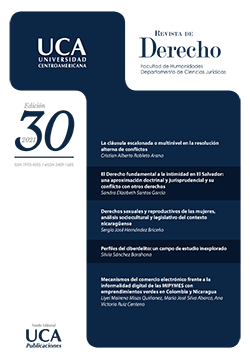The Fundamental right to Privacy in El Salvador: a doctrinal and jurisprudential approach and its conflict with other rights
DOI:
https://doi.org/10.5377/derecho.v1i30.12222Keywords:
Constitutional law, Right to privacyAbstract
The origin of the right to privacy is located at the time when all freedom rights arise, a period in which human beings are concerned about their individuality. This concern to protect the interior was reflected in the first declarations of rights, typical of the Liberal Constitutionalism. However, at present the right to privacy ceases to be a mere freedom, and no longer only demands respect through abstention from others, but its owner has a more active role, seeking to have control of the information and that he does not want to be known, since that allows him to interact in society without compromising his private life. In this sense, it is relevant to know the concept of American privacy, its influence on Comparative Law and on the pronouncements of the European Court of Human Rights. Similarly, it is also useful to know how the Constitutional Chamber and the Institute for Access to Public Information of El Salvador had addressed the issue of interference with the right to privacy and the conflict with other fundamental rights.
Downloads
833
HTML (Español (España)) 166
Published
How to Cite
Issue
Section
License
Copyright (c) 2021 Universidad Centroamericana

This work is licensed under a Creative Commons Attribution-NonCommercial-ShareAlike 4.0 International License.
© Copyright Universidad Centroamericana (UCA)
The author undertakes not to submit any article to any other journal or publication simultaneously.The content of the research article is the sole responsibility of the author, as a result, the Law Journal is released from any responsibility derived from the content of the work.
The author assigns the Revista de Derecho, the right to publish the article, distribute it and market it in the way he considers convenient, nationally and internationally, in printed and electronic format;as well as its inclusion in directories, bibliographic bases and international indexes.

This work is licensed under a licencia de Creative Commons Reconocimiento-NoComercial-CompartirIgual 4.0.




